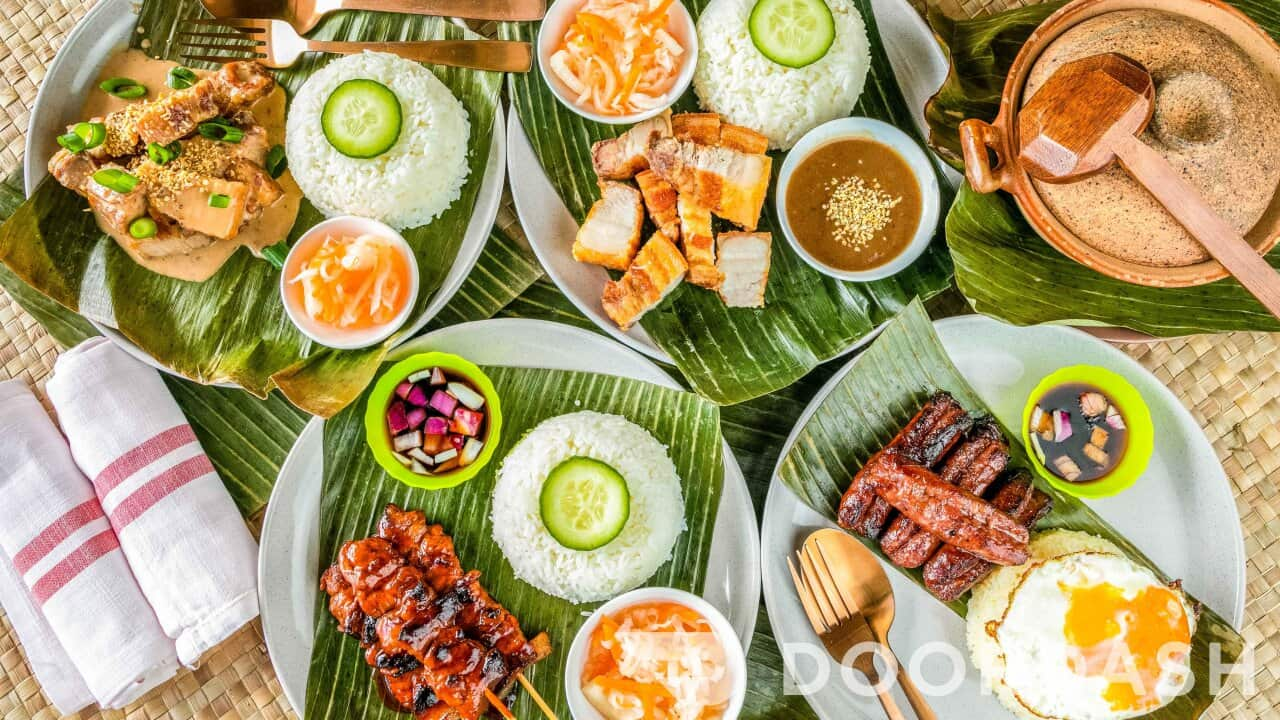--- 's third season airs weeknights on SBS Food at 7.00pm. All episodes including 'all fired up' are available anytime on SBS On Demand. ---
When I think of Filipino barbecues, I think of theatrics and ritual. I remember the smoke wafting from the grill, blackened by charcoal and thick, burnt marinade. I think of the cook fanning and blowing on coals to grow the fire, my hair smelling of smoke, and satisfying sticks of fatty, sweet, salty and spicy meat.
ABOUT INIHAW

Inihaw: Barbecue the Filipino chargrill way
Banana ketchup and soda marinade
Filipino barbecue marinades are wet. They're typically made of salt, pepper, vinegar, soy sauce, sugar and calamansi (Filipino citrus), banana ketchup and lemon-lime soda. Calamansi gives meat acidity, so it tastes sweet and tangy.
Banana ketchup is loved in the Philippines, and it often accompanies fried chicken and . Banana ketchup gives marinades a bright, red colouring and a subtle sweet flavour. And the lemon-lime soda? Aside from being sweet, the carbonation tenderises the meat.
And the lemon-lime soda? Aside from being sweet, the carbonation tenderises the meat.

Banana ketchup: enjoy it straight from the bottle or turn it into a sticky glaze. Source: Under Coconut Skies
Marinate the meat overnight, not any longer.
Soaking skewers
There's just something about grilled meats on a stick. Not only are they easier to turn on a grill, they make for convenient eating.
If you're going to skewer your meat, use bamboo skewers. Although not as easy to cook with as their metal counterparts, bamboo skewers make inihaw authentic.
To soften the sticks, soak them at the same time you're marinating the meat. Soaking the sticks prevents them from burning when they're on the grill. Offcuts and offals
Offcuts and offals

Source: Hugh Fearnley-Whittingstall
While the common cuts of pork and chicken are still the most popular meats to skewer and grill, Filipino barbecues aren't limited to them. When it comes to Filipino food and cooking, the mantra is usually 'nothing wasted'.
There's just something about grilled meats on a stick.
Some of the more popular, cleverly named barbecued offcuts and offals on sticks are isaw (intestines), Betamax (rectangular coagulated pig's blood resembling the shape of the iconic 1980s Betamax tapes), Adidas (chicken feet and, yes that's why they're named after a sneaker brand), helmet (chicken head) and walkman (pig's ears). Sawsawan
Sawsawan

Filipino grilled small pork intestines fresh off the grill. Source: Barkada Pinoy Streetfood
A Filipino barbecue just doesn't feel complete without a dipping sauce (sawsawan).
The dipping sauce can vary from province to province, depending on the kind of vinegar produced and that's beloved in the area. However, you can never go wrong with a concoction of soy sauce, white vinegar, calamansi and chilli. You can also add minced garlic and chopped white onions to the mix to give the sauce an extra punch.
You can also add minced garlic and chopped white onions to the mix to give the sauce an extra punch.

Every afternoon, you'll find meat skewers grilled and sold on the streets in the Philippines. Source: Sydney Cebu Lechon
Side dishes
Aside from dipping sauces, a Filipino barbecue can also be served with a side of achara (pickled green papaya) or ensalada (chopped tomatoes and garlic with cilantro and a dash of fish sauce).
ACHARA RECIPE

Achara
These salads not only add crunch to the meal, but also counter the fat and grease.
If those side dishes aren't filling enough, barbecues are delicious served with other main dishes such as pancit (noodles) and lumpia (spring rolls). Rice, please
Rice, please

Put Filipino food, like pancit palabok, on your radar. Pancit palabok combines the quintessential flavours of the Phillipines on one plate. Source: SBS Food
Like any Filipino meal, barbecues feel incomplete without rice.
Filipino dishes are deep, strong and brimming with umami flavour. Inihaw, its dipping sauces and its side dishes are no different. Plain, subtly nutty white rice balances them out, giving your tastebuds a break.
But then again, for those used to strong flavours, Filipino barbecue goes really well with Java rice (fried rice with annatto and turmeric) or garlic rice (with extra garlic bits, please).




